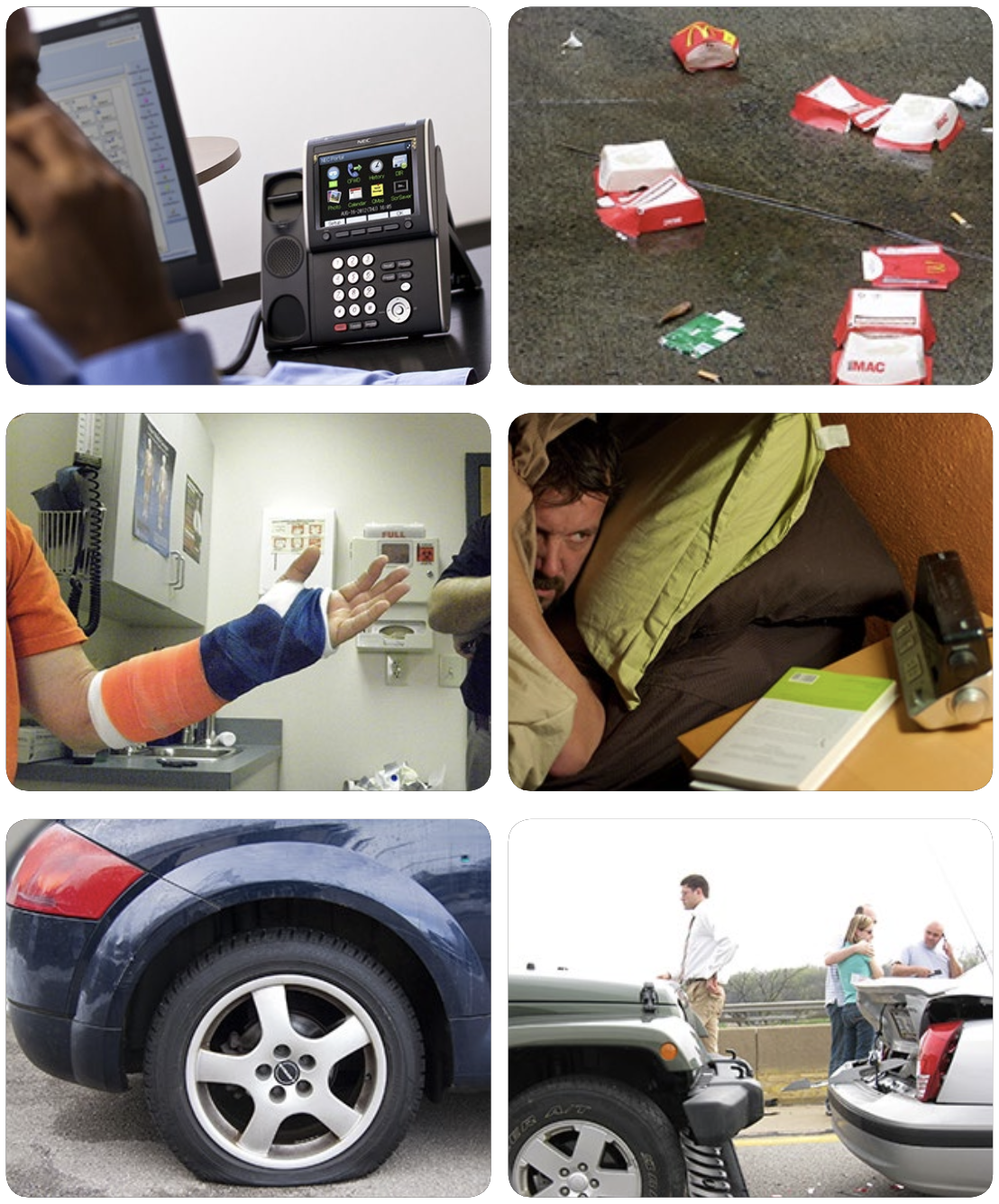4.5: Speaking
- Page ID
- 92908
Intonation Scaffolding Activities
Choppy vs. Flowing Speech
 Two images from the campground give us metaphors to describe how people speak.
Two images from the campground give us metaphors to describe how people speak.
When a camper is using an axe to cut wood, we say he or she is chopping wood. Chopping is a short, repeated action. Each chop has a beginning and an end. The sound of chopping is sharp or abrupt. There is a clear snap when a chop stops.
CHOPPY is an adjective that describes the sound of speaking if the speaker chops a phrase or sentence into separate words with a short stop after each word.
Listen to the choppy sound of this sentence. Notice that each word is pronounced very distinctly so the words are separated, and the sentence is not smooth, but choppy.
 Roshan said, “I want to express a regret about the damaged truck.”
Roshan said, “I want to express a regret about the damaged truck.”

When a camper is pumping water out of the well, we say the water is flowing. We talk about flowing, or running, water because it moves smoothly and continuously. There are no sharp or abrupt sounds.
Flowing, or FLUENT, describes the sound of speaking if a speaker’s words gently join, or link.
 Listen to the above examples first with CHOPPY and then with LINKED, or FLUENT, pronunciation.
Listen to the above examples first with CHOPPY and then with LINKED, or FLUENT, pronunciation.
- A consonant at the end of one word join with the same consonant at the beginning of the next word so we hear only one longer consonant.
For example, “want to” will sound like “wan-to”
- A final consonant will flow into a beginning vowel so we don’t hear even a tiny stop between the two words.
For example, “express a” will sound like “expres-sa” and “regret about” will sound like “regre-tabout”
- A final consonant that usually stops air completely before letting the air pop out (d, t, b, p, g, k) will flow into another beginning consonant without releasing air so the sound becomes softer.
For example, “damaged truck” will sound like “damag-dtruck”
Listen to the original choppy sentence followed by the same sentence with smooth, flowing pronunciation. Notice how some consonants and vowels flow together, linking some words. Notice that punctuation, such as the comma after “Roshan said,” always makes the speaker pause. Even this short stop prevents the final “d” in “said” from flowing into the next word, “I.”
 Roshan said, “I want to express a regret about the damaged truck.”
Roshan said, “I want to express a regret about the damaged truck.”
In the video and audio for this chapter, the characters speak fluently. The words in their sentences flow gently together.
In the sentences on the right, identify each final consonant that should link to
- a beginning vowel
- the same beginning consonant
- a different beginning consonant
Example
Ivan wants to turn over a new leaf.
Ivan wants to tur-nove-ra new leaf.
- I won’t apologize for that.
- Sorry, could you hang on a second?
- My truck isn’t easily offended.
- I left acouple of messages.
- Your campers are frightened of these bears.
- I am an old man.
- You don’t even owe me an apology.
- Sorry, Roshan. I really can’t accept this.
- I’ll take care of it right away.
- Accountability is an important part of your character, Roshan.
Listen to these sentences.
- Compare choppy pronunciation to fluent speech.
- Repeat the example of linked sounds aloud.
Speaking Tasks
Saying “sorry” happens between familiar and unfamiliar people for a variety of reasons. A sincere apology, such as Claire’s to Gilles, means taking responsibility for inappropriate behaviour and changing that behaviour. We often hear “sorry” used similarly to “excuse me.” People understand they are interrupting someone or perhaps accidently caused a small problem. “Sorry” can be a signal that no harm was intended and that the speaker hopes to continue a peaceful relationship. “Sorry” is not a synonym for “I’m so ashamed” or “I’m guilty.”
The way we explain the reason for a mistake depends very much on our relationships. In general, Canadians do not expect or believe long, detailed explanations. Giving a long excuse for inappropriate behaviour focuses attention on the problem rather than moving quickly to solve it. When a blunder is recognized, a face-to-face talk with the individual most affected is a common response, as Claire and Ivan demonstrated.
Here are some pictures of situations in which someone may apologize. Whether or not an excuse is given and how detailed it is depends on factors such as how big a problem is caused and how many people are affected. The more serious the consequences, the more carefully people will consider if the harmful actions were intentional or accidental.

Speaking 1: Expressing Apologies and/or Excuses
Apologies matter among familiar people.
For this role-play activity, imagine that you are one of the people on the festival award committee. You have been meeting together for several weeks. The second-last session is set up for all the committee members at the Maskwa County office at 7:00 p.m. You arrive at 7:45 p.m.
As you enter the room, you notice everyone else is present and in the middle of a discussion. You offer a simple, clear apology but make no excuses. You take your seat.
At a break in the meeting, you approach Gilles, who is chairing the meeting. Have a longer conversation with Gilles.
Do the following speaking practice. Choose another person to play the role of Gilles.
Requirements:
Part A
Join a group of people who are talking. Wait for a break in their conversation.
Apologize for arriving late.
Part B
- Later approach “Gilles.” State your purpose to apologize.
- Refer to your inappropriate behaviour.
- Explain briefly the reason for your behaviour.
- Use the modal verbs SHOULD HAVE and SHOULD NOT HAVE.
- Acknowledge the possible consequences of your behaviour.
- Offer appropriate future behaviour.
Production Task Rubric 
You can use the rubric on the right to measure how you do when offering an apology to someone familiar to you.
|
Speaking Task 1 You chose an appropriate time to make an apology and gave a reason without making excuses. |
Completely |
Mostly |
Somewhat |
Comments |
|
|---|---|---|---|---|---|
|
A |
You made a simple, clear apology. |
||||
|
B |
You clearly stated your wish to apologize. |
||||
|
You referred to the incident in a few sentences. |
|||||
|
You offered a short, believable explanation. |
|||||
|
You used the modal verbs SHOULD HAVE and SHOULD NOT HAVE. |
|||||
|
You acknowledged the possible consequences of your behaviour. |
|||||
|
You committed to certain future behaviour. |
|||||
|
You linked words in fluent speech. |
|||||
Speaking 2
Apologies matter with unfamiliar people and people of different social status. New or distant relationships could grow warmer or colder if someone takes offence at words, body language, or other behaviour of an unfamiliar person.
For this role-play activity, imagine that you are a musician. You registered your band for the Maskwa Folk Music Festival early in the spring. A month ago, you had a conflict with one of your bandmates. She quit. You planned to ask another drummer, but you didn’t. It is only one week before the festival begins. Yesterday, you had a sports accident and cannot play your guitar. When you phone Gilles to explain, he doesn’t answer. Leave a clear, organized voicemail message with only the important facts and your regrets.
Requirements:
- Identify yourself and the name of your band.
- Tell Gilles whether or not your band will beat the festival.
- Describe the situation briefly.
- Express regret.
- Use the modal verbs SHOULD HAVE and SHOULD NOT HAVE.
- Acknowledge the problems your band is causing for Gilles and the festival.
Production Task Rubric 
You can use the rubric on the right to measure how effective you are when offering an apology to someone familiar to you.
|
Speaking Task 2 You left a voicemail message with an apology, reasons, and regrets. |
Completely |
Mostly |
Somewhat |
Comments |
|---|---|---|---|---|
|
You identified yourself and the band. |
||||
|
You told Gilles what you are going to do. |
||||
|
You described what happened. |
||||
|
You expressed regret. |
||||
|
You used the modal verbs SHOULD HAVE and SHOULD NOT HAVE. |
||||
|
You acknowledged possible consequences of your behaviour. |
||||
|
You linked words in fluent speech. |

